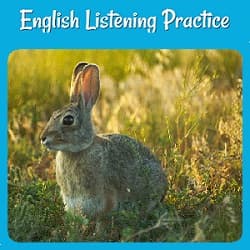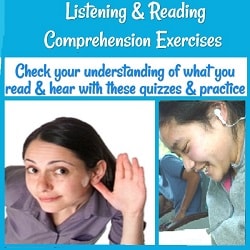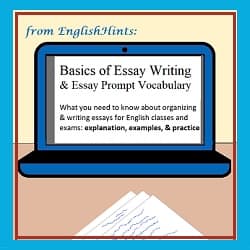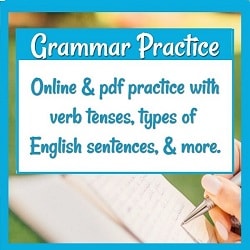Study English Online by Level & Goals
Do you need an organized way to study English online? Without a plan, you could waste a lot of time (and maybe money) before finding the best materials to help you work on your weak areas and reach your goals.
Look through the suggestions here to help you design a personal plan of online English study. (If you find quite a few, you might want to take a few notes or bookmark this page.)
The links in this section will take you straight to the correct section of this page-- or you can just scroll through it.
Start by choosing your level: Beginner to Intermediate (with suggested pages for
- practicing listening & speaking,
- understanding English grammar,
- reading hints,
- vocabulary, and idioms),
or High Intermediate to Advanced (with speaking, more vocabulary development, and writing hints.)
Below that is help for specific English study needs or goals:
- test preparation,
- English university study, and
- studying English online for business and professional purposes.
You can reach all the pages in each section of EnglishHints from the links on the blue navigation bar at the top of the page or from the sitemap. However, if you are not sure where to start and want a systematic view of what you can find on EnglishHints, follow the suggestions below.
Beginning through Intermediate English
Most pages on EnglishHints.com are written for High Beginner, Intermediate, or Advanced English learners.
For suggestions on free basic online English study, see Learn English free. If you know the sounds of English letters and can read a little English, you could also try The Verb to Be, Present Tense Verbs, and Easy Reading Books for ESL Beginners.
For online English listening practice, an excellent site is Randall’s Listening Lab, as well as his other sites (listed on the upper right on that page.) High Beginners and above can also listen to some great TED talks. I'd suggest starting with the easy (and inspirational) talks in English Listening Practice.
You can find some suggestions for talking in English in English Conversation Practice.
2 Ways to Study English Grammar Online

If you want to study or review how English is put together, look at the two study styles below and choose which is best for you.
1. Some people learn best by listening and then using what they hear. They want just the basic, most necessary explanations, and then examples and practice.
2. Others like to understand the way a language is put together, or need details about how to use a certain structure properly.
If you work better by learning just the basics and then studying lots of examples, read English Grammar Lessons and English Verb Tenses, and then study the following pages for whichever tense you need to practice, especially their examples showing how to use each form:
- Irregular Verbs, List of Irregular Verbs (with the best practice), and Practice Irregular Past Tense Verbs,
You could also just try the practices above, and if you have problems in any area review only those pages.
If you want to understand the details about a particular structure (learning style 2), in addition to the pages above also look over
- Parts of Speech in English (and the pages with more detail on nouns, verbs, etc.),
- and Modal Verbs.
Then practice them in the Grammar Practice section, as well as by reading and by taking practice Quizzes and Tests.
Intermediates will also need to use the perfect tenses as well as sentences with clauses and conditionals. Review any of these pages for structures you need:
- Past and Present Perfect Tense Use, Present and Past Perfect Tense Practice, and Irregular Past Participles)
Reading Hints for Intermediates
Reading is one of the best ways to improve & study English online, as well as to learn new vocabulary. ESL Reading, English Reading Comprehension Strategies, and Improve Your English Skills each give important suggestions if you would like to understand what you read better.
English Vowels, Vowel Digraphs, ESL Phonics, and Consonant Digraphs discuss the way the sounds of English are written, to help you pronounce what you read (or guess words you have heard but not read before.)
If you just need to read more in English, Finding English Reading Materials and Online Reading suggest some fairly easy reading sources. There are a lot more, as well as quizzes and comprehension checks in Reading Strategies Practice and Listening and Reading Comprehension Exercises. (There are also a lot of interesting readings, some with audio or video, in the English Detective newsletter. See the Back issues page.)
Learn to Write English, Essay Organization, Transition Words Practice, and the Revision and Proofreading Checklist provide a good introduction to writing in English.
Vocabulary and Idioms for Intermediates

See Learn English Vocabulary and Effective Vocabulary Strategies for help with increasing your vocabulary (in addition to reading a lot.)
Roots, Prefixes, and Suffixes and its linked root pages, List of Prefixes, Negative Prefix List, and List of Suffixes give you the pieces that combine to make many words.
Word Families
(with its two practice pages-- page bottom) demonstrates how these pieces are put together to
form different parts of speech.
Learn some of the most common idioms with Common Idioms, List of English Phrasal Verbs A-M (and P-W), and List of Idioms. Also look at Phrasal Verb Use. (Phrasal verbs are very common 2 or 3-word verbs like get along with, get up, look out, turn on, and turn off that mean something different than their individual parts.)
Once you have studied some of these phrasal verbs and idioms, see the sample conversations in Phrasal Verb & Idiom Examples and fill in the blanks on the Phrasal Verb Quiz to check your understanding.
Study Advanced English Online
For advanced English study online, concentrate on speaking in professional settings, writing, and vocabulary development-- the prefix and suffix pages mentioned above and more:
- and the practice pages mentioned in Roots, Prefixes, and Suffixes.
Understanding the News in English and News Vocabulary give some vocabulary and hints that can help you read online news reporting and commentary, a useful way to improve your English and get a better understanding of the English-speaking world and its perspective.
Learn Academic Vocabulary, since it is needed not only for university study and tests but for business and professional communication.
The English Detective newsletter, especially through issue #33 (and the Academic Vocabulary List pages that summarize the readings and practices of each issue through #23), Online Vocabulary Games, and How to Learn Professional Vocabulary are all designed to help you learn and practice the Academic Word List and other important words in academic and professional environments.
You might also want to review reading or listening skills:
- and the readings in Reading Strategies Practice or reading/listening practice in Comprehension Exercises. Lots of reading (as well as listening, watching videos and movies) is important to increase your English fluency and vocabulary, as well as your ability to analyze information and arguments in English.
English Writing: Intermediate to Advanced
It’s also important to understand English writing conventions.
- Learn to Write English is an overview.
- and the Proofreading Checklist give more detail.
If your grammar skills need brushing up, review
- and Subject Verb Agreement, all important for writing clear English.
Prepare for a
Major Test (the IELTS, TOEFL, etc.)
You should start your study with the official pages for the test you want to take. (See English Language Test Prep, which also offers many study tips.) Plan your test preparation according to the time you have before the test.
* If you have 3-6 months, read and write a little in English every day you can, and take practice tests every week or two. English Language Test Prep (above) has a number of comprehension tests that give good test prep practice.
Consider taking a course to guide your study. See Mastering English Test Vocabulary for information on courses to help you practice academic vocabulary, essay writing, reading comprehension, and other skills necessary to prepare for the TOEFL or IELTS exams or for studying at universities in English.
If you want to try to prepare on your own, there are lots of pages on EnglishHints to practice academic vocabulary and especially the lower levels of the Academic Word List.
Most important of all: Writing Test Vocabulary-- the words like analyze, explain, demonstrate, and describe that tell you what to do on a writing (or reading) test.
Other pages that teach a lot of the most important academic vocabulary include Scientific Method Vocabulary, Be a Word Detective, Adjective Opposite Matching Games, and Social Change Vocabulary.
* If you have less than 2 months, concentrate on practice tests (especially the ones on the official test site) and your weakest skills.
* The week before the test, make sure you have good directions to the test site, your ticket and needed supplies. Take a last practice test or so, keep reading English when you can, and make sure to get a good night’s rest before the test.
Prepare for University Study in English
Many of the pages above will help you. Advanced listening practice may be especially important to prepare for lectures in English. Try podcasts in subjects that interest you, or that you will be studying. See also the Advanced Listening section of Listening & Reading Comprehension Exercises. (It's just above the Reading Comprehension section.)
You may also want to review the writing and grammar sections above if your university doesn't offer its own writing help.
You might also be interested in the wide variety of resources, apps, English games, and support for students on the EduMed Resources page. (The resources start just below a section on ESL definitions and levels.)
English for Business & Professional Use
If you need to study English online for your profession or business, see Develop your English Speaking Skills or Master Business English.
Other good reading (and listening) sources include (among many others) BBC business English, and if you are able to, the Wall Street Journal or the Economist.
On EnglishHints, try Business Vocabulary, Money Words (Financial Vocabulary), or Teamwork and Cooperation Vocabulary, as well as Sports Idioms, which are common in business conversations.
Many of the academic vocabulary and writing pages listed in the Advanced section above (as well as grammar pages if you need a review) may also help if you need to make reports or presentations.
If you're a health professional, there are some very helpful resources for vocabulary and especially for medical communication on the Medical English page, in Medical Vocabulary, and in the newsletter Back Issues, especially issues #23-24 and 33-36.
Where to Next?
Choose based on your biggest need at your current level. If you're still not sure, I'd recommend:

Suggestions for A2 (High Beginner) English Listening Practice using simple but compelling TED talks on the theme of hope. (You can read the transcripts for reading practice, too.)
Practice listening & reading comprehension with exercises based on various reading sources and talks. Many include the same kinds of questions you will find on exams like the TOEFL & IELTS.
Key points to consider for English essay writing practice (+ inexpensive packets of essay practice materials for individuals or classrooms.)
Would personalized recommendations help you? Answer a few short questions on How to Improve Your English, and I can email you suggestions based on your situation and needs, or possibly arrange a quick phone chat if you prefer. There are a lot of resources available to help you study English online. Many are excellent, but some are NOT-- and by now I am familiar with a lot of them.
Home>Learning English Online>Study English Online
Didn't find what you
needed? Explain what you want in the search box below.
(For example, cognates, past tense practice, or 'get along with.') Click to see the related pages on EnglishHints.
| site search by freefind | advanced |













